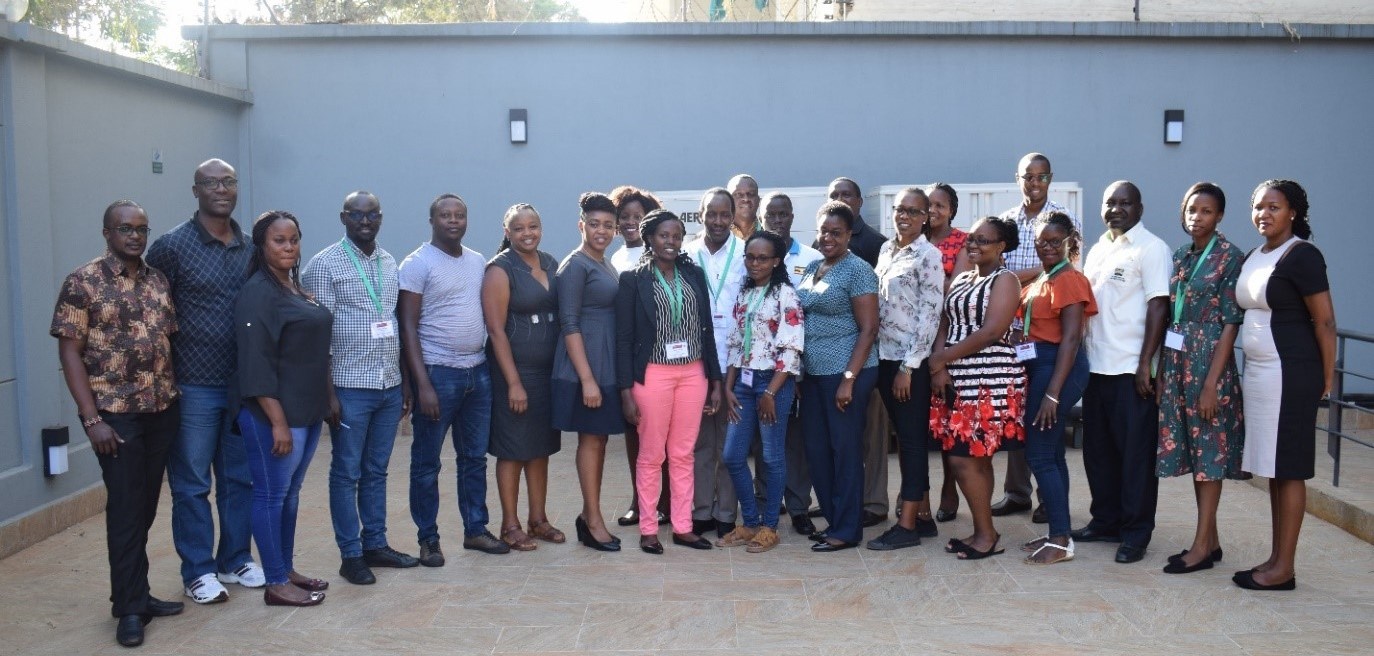
Participants of the Training Workshop on Monitoring and Evaluation for Agriculture and Rural Development, Nairobi, Kenya February 25th –March 2nd, 2019
During the week of February 25, 2019, 22 technical leaders from Ugandan and Kenyan civil societies and government ministries gathered in Nairobi, Kenya for a hands-on training on Monitoring & Evaluation (M&E). ReSAKSS East and Central Africa (ReSAKSS-ECA) organized the M&E workshop in collaboration with Uganda’s Ministry of Agriculture, Animal Industry and Fisheries (MAAIF). Throughout the week, participants applied the lectures and practical assignments to work in their home countries. At the close of the week, participant feedback instructed ReSAKSS on the usefulness of the M&E workshop, and insights on how to improve future trainings.
The February training programme emphasized skills essential for implementing the Comprehensive Africa Agriculture Development Programme (CAADP) in Uganda and Kenya. These include applying theories of change, incorporating impact evaluation into policy decisions, and practical skills like managing data in Microsoft Excel and Stata, as well as communication and technical writing skills. The interactive sessions used case studies, group projects and presentations, with opportunities to learn from the others’ experience, identifying best practices from both countries and dialogue about the common challenges.
Capacity strengthening is a key function of ReSAKSS and ReSAKSS is known for the high quality of its trainings. ReSAKSS-ECA is regularly approached by countries and non-state actors with requests to lead training workshops for staff representatives of regional institutions and state Ministries. M&E is among the many training modules that ReSAKSS provides. Following every workshop, ReSAKSS-ECA surveys participants to evaluate the course, which has helped improved the quality of the training modules over time. ReSAKSS-ECA also conducts needs assessment ahead of time, which allows them to better customize the training to suit the participants’ needs. Many ministries of agriculture fully fund the cost of ReSAKSS trainings for their staff, a demonstration of the demand for capacity training and the well-respected ReSAKSS brand.
Like all ReSAKSS trainings, at the end of the week, participants rated the logistical and technical aspects of the workshop. Participants praised most elements of the workshop, though their responses indicate that adequate time for discussion was the weakest area, followed by the trainings in data and statistical analysis. ReSAKSS-ECA Coordinator, Dr. Joseph Karugia, commented that the desire for discussion time highlights the value participants place on learning from one another and the demand for facilitating more cross-country learning opportunities. “It also exposes the limits of time during a one-week training.” ReSAKSS M&E trainings address graduate-level course concepts—a tremendous ambition for one week. “In some cases, the level of training was too high for some participants, and they would have appreciated more time to absorb the materials.” Karugia indicated that for some participants over a decade had passed since they engaged in statistical analysis. In some workshops, ReSAKSS facilitates two levels of statistical trainings to meet the needs of all participants. Often, ReSAKSS selects participants with similar skill-levels, but in other cases the sending institutions selects the participants, requiring extra scrutiny in the needs assessment so ReSAKSS can design the workshop accordingly. It is an enormous challenge to present relevant material across a range of skill levels. “Every workshop is an opportunity for learning and growth” said Karugia, “both for the participants and ReSAKSS, and we’re proud of the progress we’ve made throughout the years.”
By Joseph Karugia and Julie Kurtz.
